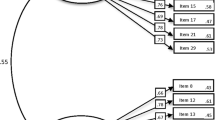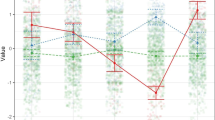Abstract
This chapter provides an overview of the 16-item self-report Southampton Mindfulness Questionnaire (SMQ) that was developed to assess mindful responses to distressing thoughts and images. Theoretical foundations of the scale and its development and initial validation are presented. This is followed by subsequent examination of psychometric properties and information of the scale versions in other languages. Table 1 shows the SMQ in its current version, followed by an explanation of the scoring. The parallel voice version of the SMQ, named Southampton Mindfulness of Voices Questionnaire (SMVQ), is introduced, while the limitations of the SMQ are discussed at the end of the chapter. The SMQ consists of four aspects of mindfulness, identified as mindfulness observation, letting go, absence of aversion, and nonjudgment. The scale developers reported promising psychometric properties and claimed a unidimensional structure of the scale. There have been a limited number of studies that have examined the psychometric properties of the SMQ, and the evidence regarding the scale’s internal validity and reliability has been mixed. The SMQ has Chinese, Spanish, and Dutch versions. Those translated versions, however, have not yet been rigorously validated. The limitation of the SMQ is that the scale may not be suitable for general use as it does not contain items about positive or neutral cognitions and does not assess mindful responses to a wide range of experiences in everyday life.
Similar content being viewed by others
References
Baer, R. A., Smith, G. T., Hopkins, J., Krietemeyer, J., & Toney, L. (2006). Using self-report assessment methods to explore facets of mindfulness. Assessment, 13(1), 27–45.
Bergomi, C., Tschacher, W., & Kupper, Z. (2013). The assessment of mindfulness with self-report measures: Existing scales and open issues. Mindfulness, 4(3), 191–202. https://doi.org/10.1007/s12671-012-0110-9
Brown, K. W., & Ryan, R. M. (2003). The benefit of being present: Mindfulness and its role in psychological well-being. Journal of Personality and Social Psychology, 84(4), 822–848. https://doi.org/10.1037/0022-3514.84.4.822
Chadwick, P., Barnbrook, E., & Taylor, N. K. (2007). Responding mindfully to distressing voices: Links with meaning, affect and relationship with voice. Tidsskrift for Norsk Psykologforening, 44(5), 581–587.
Chadwick, P., Hughes, S., Russell, D., Russell, I., & Dagnan, D. (2009). Mindfulness groups for distressing voices and paranoia: A replication and randomized feasibility trial. Behavioural and Cognitive Psychotherapy, 37(4), 403–412. https://doi.org/10.1017/S1352465809990166
Chadwick, P., Taylor, N. K., & Abba, N. (2005). Mindfulness groups for people with psychosis. Behavioral and Cognitive Psychotherapy, 33, 351–359. https://doi.org/10.1017/S1352465805002158
Chadwick, P. D. J., Hember, M., Symes, J., Peters, E., Kuipers, E., & Dagnan, D. (2008). Responding mindfully to distressing thoughts and images: Reliability and validity of the Southampton Mindfulness Questionnaire (SMQ). British Journal of Clinical Psychology, 47(Pt 4), 451–455. https://doi.org/10.1348/014466508X314891
Costello, A. B., & Osborne, J. W. (2005). Best practices in exploratory factor analysis: Four recommendations for getting the most from your analysis. Practical Assessment, Research and Evaluation, 10(7), 1–9.
Kabat-Zinn, J. (1990). Full catastrophe living: The program of the stress reduction clinic at the university of Massachusetts medical centre. Dell.
Kabat-Zinn, J. (1994). Wherever you go, there you are. Hyperion Books.
Kabat-Zinn, J. (2011). Some reflections on the origins of MBSR, skillful means, and the trouble with maps. Contemporary Buddhism, 12(1), 281–306. https://doi.org/10.1080/14639947.2011.564844
Langer, A., Cangas, A. J., & Fuentes, E. (2012). Applying mindfulness therapy in a group of psychotic individuals: A controlled study. Behavioural and Cognitive Psychotherapy, 40(1), 105–109. https://doi.org/10.1017/S1352465811000464
Ledesma, R. D., & Valero-Mora, P. (2007). Determining the number of factors to retain in EFA: An easy-to-use computer program for carrying out parallel analysis. Practical Assessment, Research and Evaluation, 12(2), 1–11.
Ledesma, R. D., Valero-Mora, P., & Macneth, G. (2015). The Scree test and the number of factors: A dynamic graphics approach. Spanish Journal of Psychology, 18(e11), 1–10. https://doi.org/10.1017/sjp.2015.13
Perona-Garcelán, S., García-Montes, J. M., López-Jiménez, A. M., Rodríguez-Testal, J. F., Ruiz-Veguilla, M., Ductor-Recuerda, M. J., … Pérez-Álvarez, M. (2014). Relationship between self-focused attention and mindfulness in people with and without hallucination proneness. Spanish Journal of Psychology, 17(e20), 1–8.
Perona-Garcelán, S., García-Montes, J. M., Rodríguez-Testal, J. F., López-Jiménez, A. M., Ruiz-Veguilla, M., Ductor-Recuerda, M. J., … Pérez-Álvarez, M. (2014). Relationship between childhood trauma, mindfulness, and dissociation in subjects with and without hallucination proneness. Journal of Trauma and Dissociation, 15(1), 35–51. https://doi.org/10.1080/15299732.2013.821433
Safran, J., & Segal, Z. (1996). Interpersonal process in cognitive therapy. Jason Aronson.
Segal, Z. V., Teasdale, J. D., & Williams, J. M. G. (2002). Mindfulness-based cognitive therapy for depression. Guilford.
Strauss, C., Hayward, M., & Chadwick, P. (2012). Group person-based cognitive therapy for chronic depression: A pilot randomized controlled trial. British Journal of Clinical Psychology, 51(3), 345–350. https://doi.org/10.1111/j.2044-8260.2012.02036.x
Tavakol, M., & Dennick, R. (2011). Making sense of Cronbach’s alpha. International Journal of Medical Education, 2, 53–55. https://doi.org/10.5116/ijme.4dfb.8dfd
Teasdale, J. D., Moore, R. G., Hayhurst, H., Pope, M., Williams, S., & Segal, Z. V. (2002). Metacognitive awareness and prevention of relapse in depression: Empirical evidence. Journal of Consulting and Clinical Psychology, 70(2), 275–287.
Van der Valk, R., Waerdt, S. V. D., Meijer, C. J., Hout, I. V. D., & Haan, L. D. (2013). Feasibility of mindfulness-based therapy in patients recovering from a first psychotic episode: A pilot study. Early Intervention in Psychiatry, 7(1), 64–70. https://doi.org/10.1111/j.1751-7893.2012.00356.x
Wong, A. W. S., & Chen, E. Y. H. (2015). Psychometric properties of translated outcome measures of cognitive behavioural therapy for psychosis in the Chinese context. Asian Journal of Psychiatry, 13, 62–65. https://doi.org/10.1016/j.ajp.2014.09.005
Author information
Authors and Affiliations
Corresponding author
Editor information
Editors and Affiliations
Rights and permissions
Copyright information
© 2022 Springer Nature Switzerland AG
About this entry
Cite this entry
Feng, X.J., Chen, Y., Webster, C.S., Moir, F., Hobson, J., Henning, M.A. (2022). Southampton Mindfulness Questionnaire. In: Medvedev, O.N., Krägeloh, C.U., Siegert, R.J., Singh, N.N. (eds) Handbook of Assessment in Mindfulness Research. Springer, Cham. https://doi.org/10.1007/978-3-030-77644-2_22-1
Download citation
DOI: https://doi.org/10.1007/978-3-030-77644-2_22-1
Received:
Accepted:
Published:
Publisher Name: Springer, Cham
Print ISBN: 978-3-030-77644-2
Online ISBN: 978-3-030-77644-2
eBook Packages: Springer Reference Behavioral Science and PsychologyReference Module Humanities and Social SciencesReference Module Business, Economics and Social Sciences




